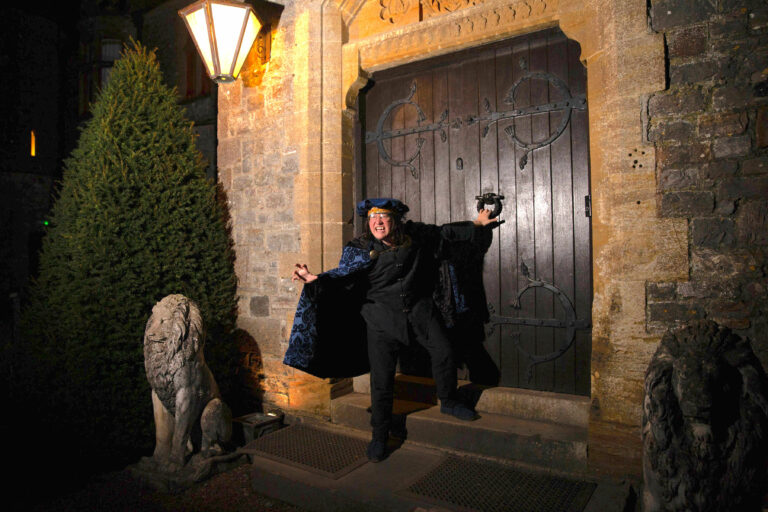
Embracing Felix – My Experience at Giovanni: The Last Supper
April 29, 2023 Jamey Alea 0 Comments
Last month, I attended a Vampire: the Masquerade blockbuster LARP on a whole different scale than any I’d done before. Giovanni: The Last Supper, hosted by Orion Games, was a three-day long immersive affair held on a Victorian estate in the English countryside. It was out of my LARP comfort zone in a number of ways, and I found the experience really interesting in a bunch of different ways.
First of all, the level of buy-in was enormous. I committed to this game 18 months in advance, making the decision to fly across the ocean to play. It was set in 1454, which is the first time I’ve played in a large-scale historical game, and planning my costumes for a Renaissance era game was also a whole new level of buy-in. It was also my first multi-day larp event, which required a much bigger investment of energy at the event itself than I was used to from other games. What I’m trying to say here is: it was a lot!
Here’s the premise of the game: in the early fourteenth century there was a day when the sun didn’t rise. A small numbers of mortals born on that day, under the Black Dawn, manifested unique supernatural powers. The Giovanni discovered this and collected as many of these strange Black Sun humans (as we called them on our run) as they could find, with the intention of selling them—and their powerful abilities—to whatever clan could offer the right price. So they held an auction, and powerful kindred from around the world gathered to meet, bid on and potentially embrace these humans who had been living in captivity at Claudius Giovanni’s estate. Giovanni: The Last Supper was the story of those humans and that auction.
Naturally, that meant some people were playing vampires—mainly important canon vampires from Vampire: the Masquerade lore—and others were playing these Black Sun humans. This seems like a good time to tell you about my character. They used a system where you applied for characters in ranked order of your preferences, and I was fortunate enough to get my first choice—a Black Sun human known as the Forger, whose power allowed them to make perfect replicas of any piece of art they saw, in any medium, but also cursed them to never be able to produce anything original. I (correctly) thought that this power would be interesting for the character I wanted to play, and I had a rather specific idea—I’m a letterpress printer in real life, and the game being set in 1454 meant I could be one of Gutenberg’s contemporaries. I pitched this to the creators and they took it and ran with it for me, writing me a 35-page game brief about my character’s whole life: from a young scribe being passed between unscrupulous masters, to becoming Gutenberg’s apprentice as he worked on the printing press in secret, to grieving the death of his master and vowing to complete his life’s worth, before ultimately being collected by Claudius and taken to his estate in Florence to await the auction. This is how my character, Felix Vogel of Mainz, was born.
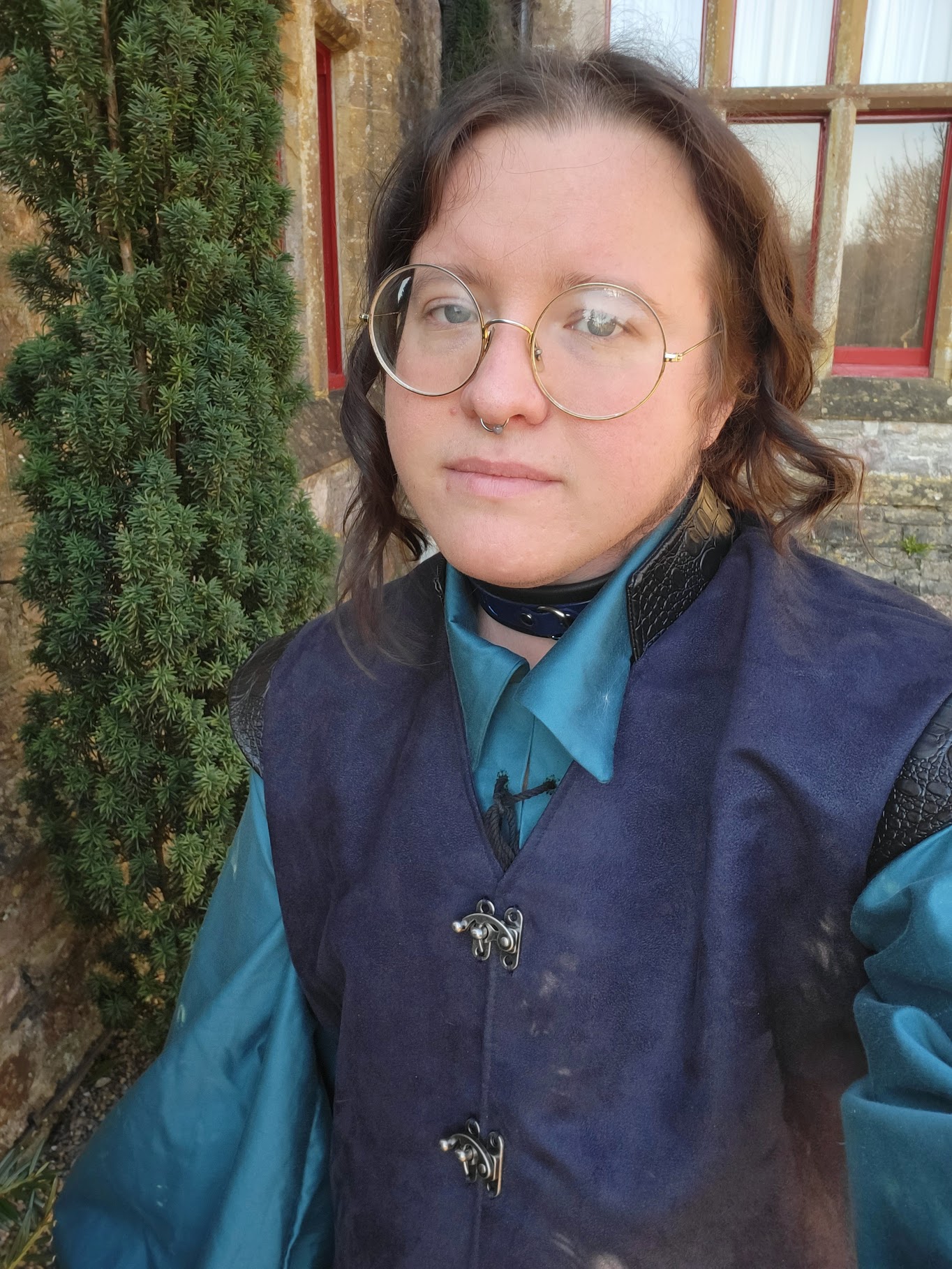
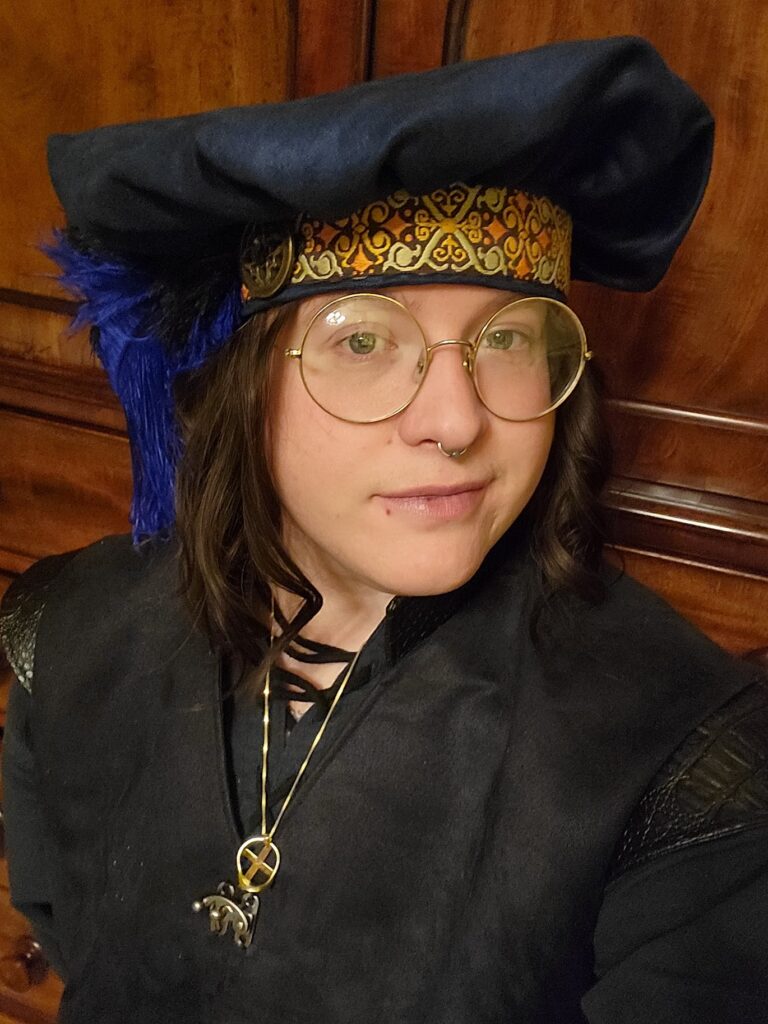
Reading my brief for the first time 3 months before game and seeing the story that the game-runners made for me was thrilling, and it was the first time it became obvious to me as a player how much work planning this game was. There were around 70 people playing in each run, which means over 400 character briefs went out to players. I’m sure not all of the briefs were unique; with multiple people playing the same character during different runs, I can see how some of them could be easily shared. But I talked to several of the other Forgers from the other runs and Felix was the only printing press Forger, so I know that many of the briefs were unique and I’m floored by the level of attention and care that was put into all of these many characters.
That feeling inspired me to match that level of attention and care while I continued to flesh out Felix’s character and prepare for my trip to the UK. For me, that always means going on a quest for the perfect costuming and props, which can add so much characterization and depth. And Felix’s connection with printing made props a particularly exciting prospect for me. I ended up making these Gutenberg bible reproduction pages, meant to represent proof pages of what Felix was working on with the press, so that I could give them out during the game as an in-character way of explaining what Felix is all about.
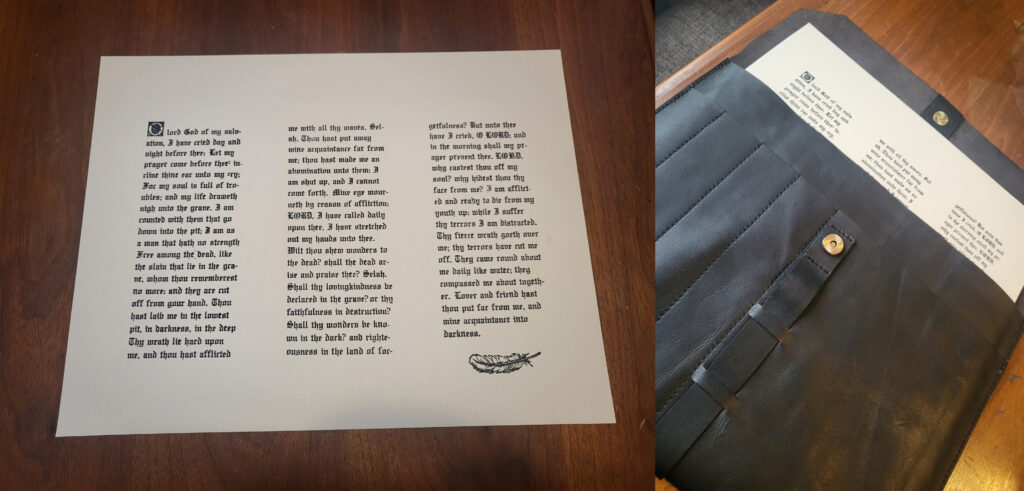
And then I packed up my suitcase with Renaissance clothes and my leather file full of my painstakingly made bible prints, and flew to London. And then took a train from London through the English countryside. And then a taxi from the train station to the remote by idyllic country estate that would act as Claudius’ mansion and the backdrop for the next few days of action and intrigue. Needless to say, it was a long journey.
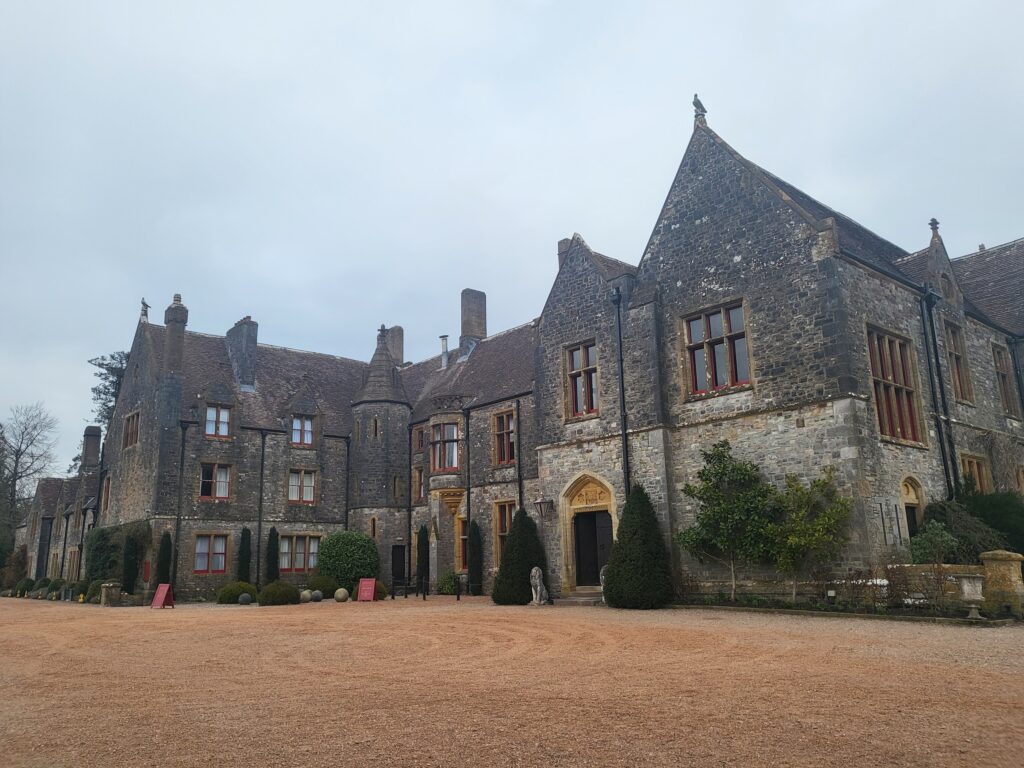
The estate, in many ways, was the heartbeat of the whole event. Once I arrived there, I didn’t step foot off the grounds again until the game was over. For 4 days, that estate was our home and all 70 players lived and ate there together, like some sort of advanced theater kid summer camp. It felt incredibly immersive to be surrounded by the location all the time. In some ways, it was more than immersive, it was almost encompassing, like nothing else existed besides the game for those 4 days. Even during the (relatively few) hours that we weren’t playing or sleeping, everything was still in service to the game. We did workshops with the organizers, we talked and plotted and came up with relationships between our characters and plans for what they’d try to do together during the next game session. Being in the estate together the whole time made it so much easier to engage with the game on this kind of meta level with friends, and it was almost like a whole extra layer of game to play.
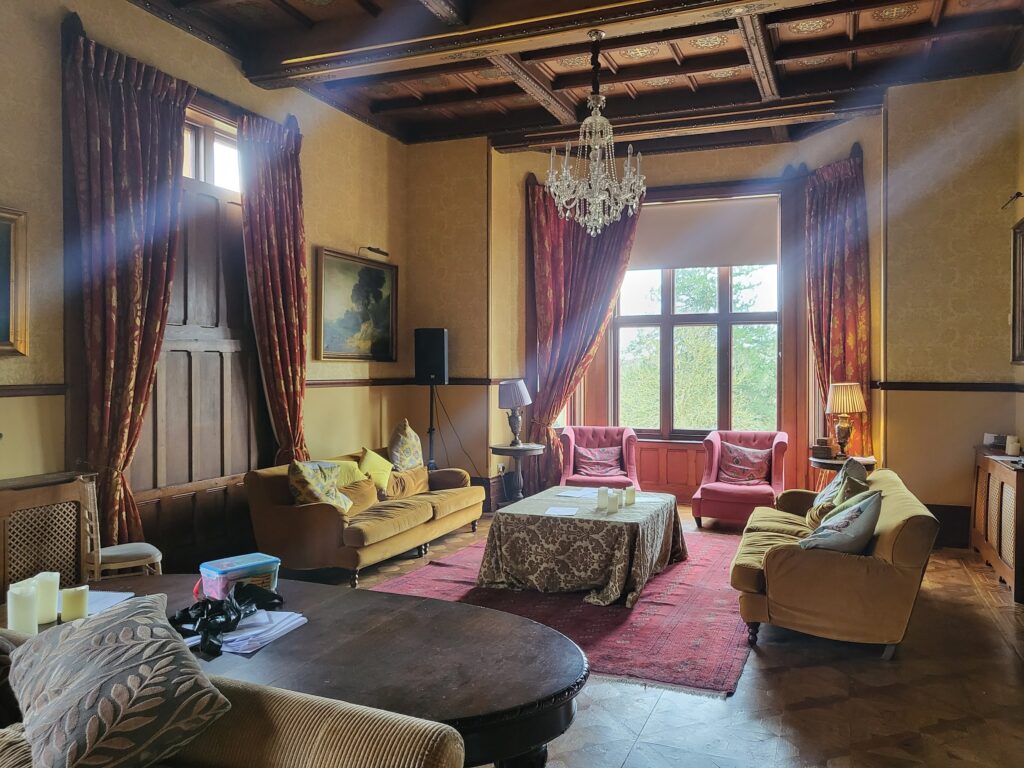

But at this point, I’ve talked around the game a lot. So what was it actually like to play in? Like all the LARPs I play in, it was a Nordic-style game—I’ve talked about Nordics before, but that basically means that it was based around collaborative storytelling, rather than crunchy game mechanics. It was also structured in such a way that the story ramped up in intensity over the course of the three days. The first night was relatively low stakes, essentially a meet-and-greet: the vampires arrived at the mansion and started to get to know the humans they might be bidding on, with the reserve bids being announced at the end of the night. Most of night two focused around the auction itself and all the politics that surrounded it. And then night three began with a scene called “hide and seek,” an organized escape attempt on the part of the humans, where they could hide and potentially be found and embraced by someone other than the vampire who won them the night before. This was a fun and dramatic way to fix an interesting clash between the plot of the game and the consent-based nature of how it was being run: the humans had no direct agency in the outcome of the auction, but the players portraying humans did have final say over who they would be embraced by, so the “jailbreak” was a method of connecting humans players with the vampire player they had pre-negotiated with. Then the rest of night three was mired in the political fallout from that first scene, further complicated by the newly-embraced former humans getting into trouble with their brand new vampire powers.
I loved this format: it was great having a high level idea of what to expect, and the ability to recalibrate between sessions. Here’s a story about what I mean by recalibration. I had a great time on night one! Felix met a number of different vampires and had a variety of experiences talking with and observing them. His goal was to get people excited about his printing press—if he was going to be sold and turned into a vampire, he at least wanted to find someone who would share his ambitions regarding getting the press out into the world. And he did an excellent job! I had a number of great scenes of Felix explaining how the press worked, showing off examples of metal moveable type, and giving out copies of his bible prints.
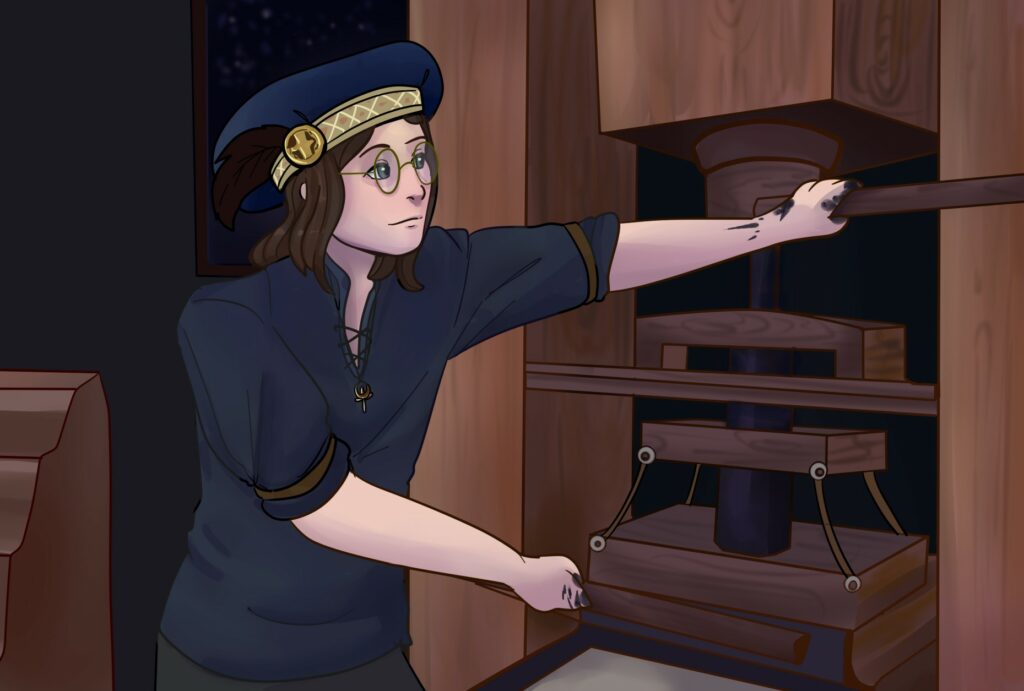
But at the end of the night when I took some time to reflect on how my first session of the game had gone, I realized I wasn’t entirely happy with my performance. I’d been awfully passive, smiling and nodding and going along with whatever the vampire players told me to do. This was perfectly in character for Felix, but I realized I didn’t feel as much agency over my own story as I wanted. If this had been a one day game, it would have been over and I would have lived with those regrets and ideas for how I could have played differently. But it wasn’t over, and I just decided to change up my play style for night two! I decided that Felix hadn’t gotten to rest during the day leading up to the auction, which let me play him differently: a bit manic, with lowered inhibitions, and ultimately, more assertive. It was cool that I got to adjust the way I played Felix without changing anything inherent about his character; in fact, it ended up being an excuse to flesh out his character more, letting him grow and change as he had new experiences, just like a real person does.
The story I told with Felix was essentially about agency, a story of a man trying to wrest back some control over his life, and being rewarded for his newfound confidence. He ended up in the fortunate position of getting to make a choice between two options that were both pretty appealing—clan Brujah, who were interested in his press for political reasons, wanting to spread their radical ideas about equality, or clan Toreador, who were interested in it more for pure artistic merit. Both clans agreed to help him get bought in the auction by whoever he chose, and keep him out of the eager hands of the untrustworthy clan Tremere. (More on why some of the vampires were being so nice to the humans in a bit.)
After a number of fascinating conversations about the historical role of the printing press in the spread of knowledge—and debates about whether being able to spread knowledge was a good or a bad thing—Felix chose to go with the Toreador. His ability to make copies but never originals had also cursed him with imposter syndrome and he longed to be trained as a real artist. His sire-to-be, Katherine de Montpellier, convinced him that he would finally succeed where he had long failed with the help of the Toreador blood, and he decided to follow her to France to try to prove her right, renaming himself Felix Gensfleish de Montpellier in the process. But he also agreed to help the Brujah with their quest for freedom, promising to build them a press of their own for use in their upcoming “Anarch revolts.” (This also gave me the chance to play alongside my favorite canon character in all VtM lore—Tyler, the founder of the Anarch Movement—and it was thrilling for my character to get to be a little part of her story too.)
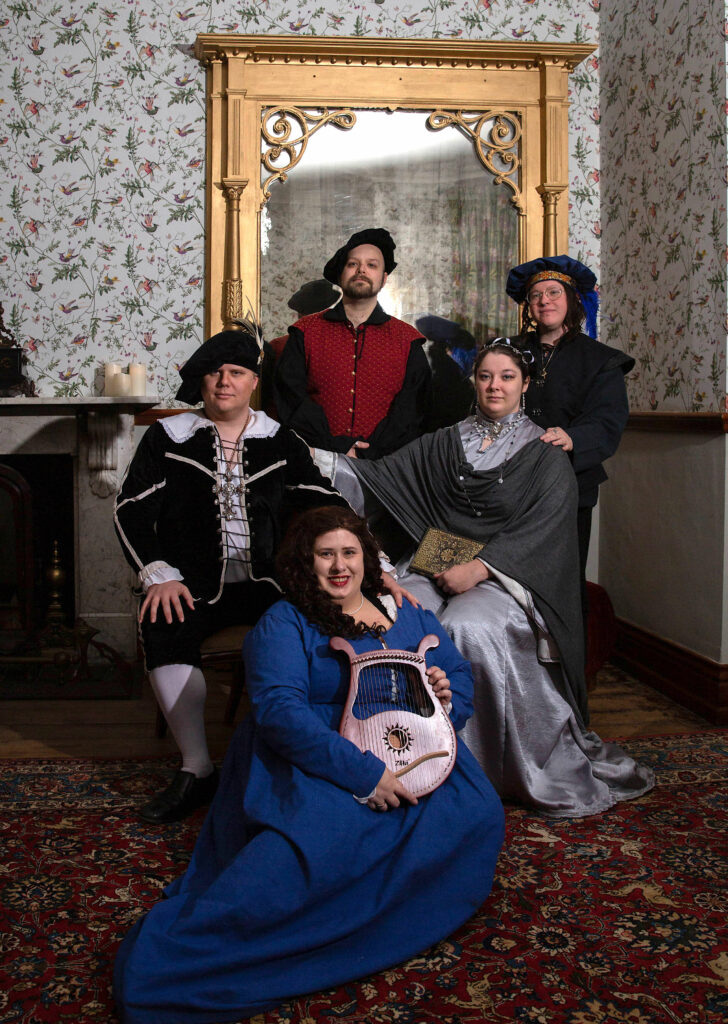
Clearly, Felix’s arc is not a story about personal horror. I actually felt a little self-conscious about this at first. Vampire: the Masquerade is a game that’s really about personal horror at its core, and naturally, many of the other human players were telling stories about it. There were so many tales being spun on that estate, and I saw so much wonderful drama and tragedy unfold. At times, it made me second-guess my decisions a bit: should Felix’s story be featuring more drama, intrigue or tragedy? But ultimately, I decided I wanted to do a story more focused on empowerment and growth—and that’s alright too. I was going through some personal stuff around the time of game that had me feeling rather fragile, so I think it was the right call not pushing myself into something that was more intense emotionally than I could handle. (To be honest, I don’t know how I would have done this game at all if I hadn’t been surrounded the whole time by 70 of the most loving, supportive people I know!) But it’s not as if you need an excuse not to do personal horror; Felix wasn’t the only human that got a happy ending, and it can be lovely and cathartic to let nice things happen to your characters, especially if they’ve “earned” it through character development.
I’ve spoken a few times now about the other human players, and they were a huge part of my experience, because much of the emotional content of the game was focused around the relationships between the human characters. Despite (or in most cases, because of) our interesting powers, we had pretty universally lived difficult and tragic lives before being brought together in captivity by Claudius Giovanni. Felix, at least, already felt a sense of fellowship with the other Black Sun humans—a natural “you’re like me” response after spending his whole life wondering who or what he really was. But more information came out during the game that heightened that bond: the Black Sun humans were all children of Lilith, and we dramatically found out during a shared vision where we lived through all of Lilith’s history. This made it very real and emotionally impactful for our characters, and it made us realize two big things. First, we were powerful in a way the vampires didn’t completely understand—and that information changed the dynamic when it came out, with some of the vampires realizing that these powerful humans needed to be treated with a little more respect. And second, that all of the humans were actually siblings, and in a surprisingly literal way!
We leaned into the sibling connection and it was a major motivating force that propelled the rest of the game after that. Suddenly, we weren’t just worried about ourselves and who we’d end up with after the auction; we cared about getting all the humans matched with a sire they’d be happy with. When we found out that Claudius had hidden the existence of other Black Sun humans from us, we were outraged: those were our siblings he was hiding away from us and mistreating. For Felix, at least, it also fueled anxiety, especially on night 3. After two nights of plotting with the other humans, trying to find times when we wouldn’t be noticed to sneak away from the vampires to clandestinely pass around information, it was an abrupt and rather jarring change of stakes after we had all been embraced and were busy with our new clans. But I was able to use that jarring feeling as part of Felix’s story, and his night 3 focused mainly around his complicated feelings about finally leaving the estate where he had been imprisoned for the past 2 years, but also where he had become accustomed to living full time with all these people he had come to care deeply about. I was even rewarded with some emotional catharsis when Felix opened up to some of his loved ones about how much he’d miss them, which led to promises to visit each other, in all the various places they were being scattered across the globe. It let me end my game on a sweet and hopeful note, even after struggling with some anxiety and emotional bleed earlier in the night.
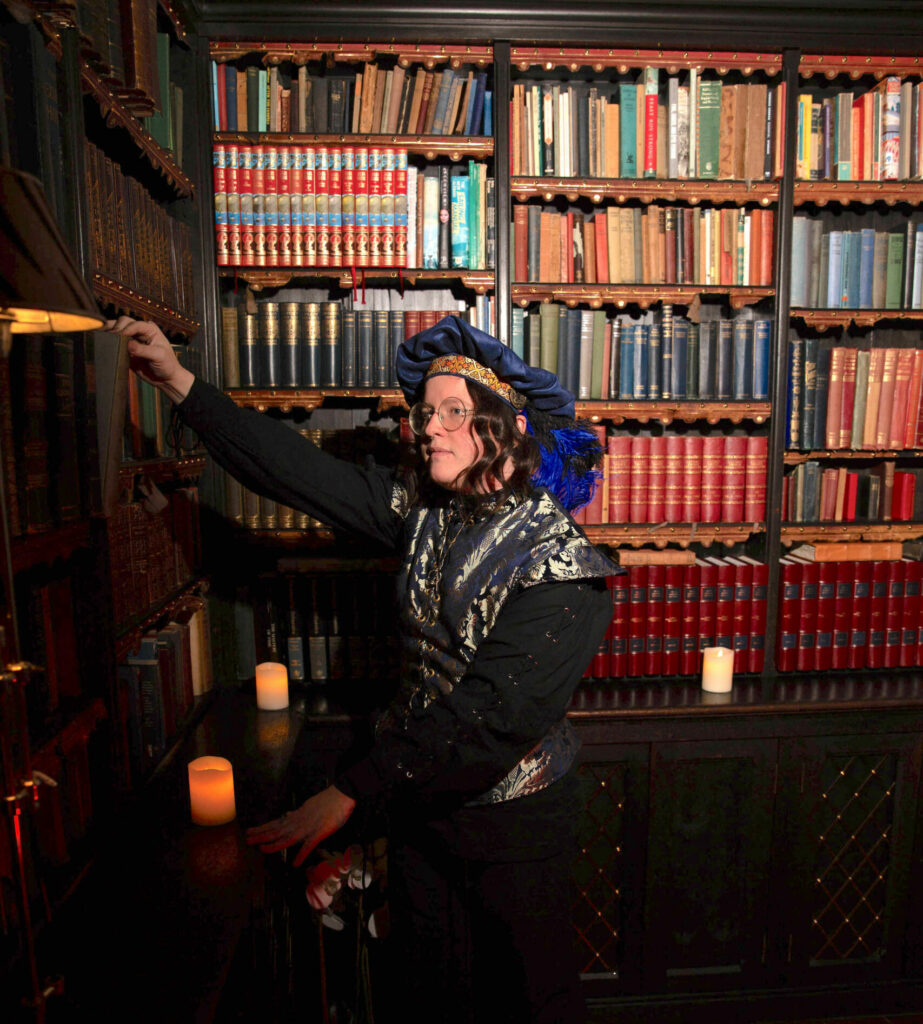
This talk about the dynamic between the human players brings me to the last super interesting thing about the game that I wanted to talk about specifically: the fact that there were 6 runs, and things played out differently in each. All of my stories have been exclusively about the only run I attended, run 5. I only know snippets of what happened in the other runs, but my understanding is that there were a lot of differences in run 5 specifically—which is particularly interesting to me, as we were the only run populated mainly by Americans, so it seems there’s some cultural differences in the way American players interact with a LARP. The game had a lot of interesting metaplot that was essentially optional content. Some runs, I hear, didn’t interact with the metaplot much at all, but we were very engaged with it. I think that propelled the trajectory of our run in a different direction than the others, and I think the way the humans worked together and shared information was a major force in that. (In fact, I don’t think the organizers were entirely prepared for how much attention we’d pay to the metaplot, and my biggest complaints about how the game was run were related to the storytellers not having enough bandwidth to attend to all the metaplot-related scenes happening on night 3.)
So much more happened during those three in-game days at Claudius’ estate than I could possibly cover in one post. Leaving the estate and rejoining the real world after the game was over was a bizarre experience; after all I’d been through, I felt like I’d been there for ages, and it was hard to believe less than a week had actually passed. Still, I hope I was able to express a sense of what it was like to be part of a LARP this elaborate and an idea of what goes into an event of this scale. This experience got me excited about trying more types of games that might have been out of my comfort zone and spend more time investing in the friendly and welcoming LARP community, so I hope to have more experiences to relay in the near future!